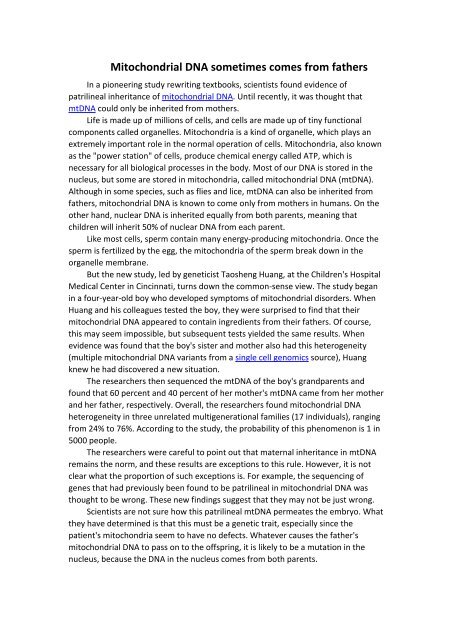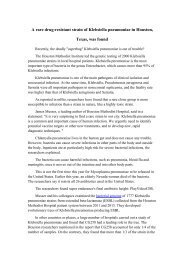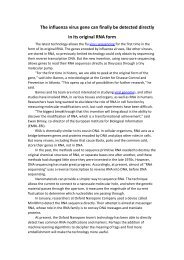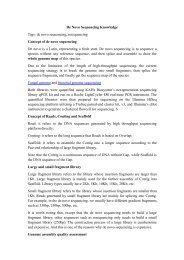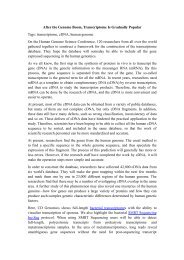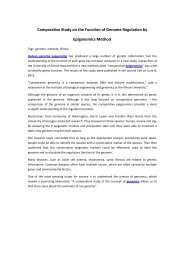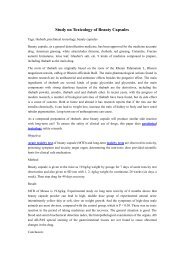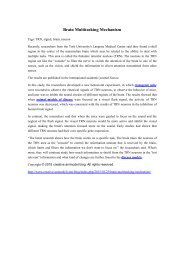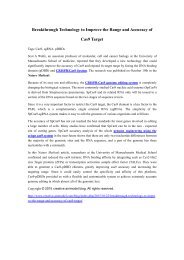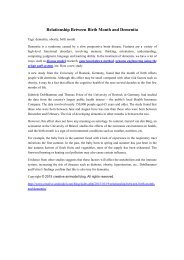Mitochondrial DNA sometimes comes from fathers
In a pioneering study rewriting textbooks, scientists found evidence of patrilineal inheritance of mitochondrial DNA. Until recently, it was thought that mtDNA could only be inherited from mothers.
In a pioneering study rewriting textbooks, scientists found evidence of patrilineal inheritance of mitochondrial DNA. Until recently, it was thought that mtDNA could only be inherited from mothers.
You also want an ePaper? Increase the reach of your titles
YUMPU automatically turns print PDFs into web optimized ePapers that Google loves.
<strong>Mitochondrial</strong> <strong>DNA</strong> <strong>sometimes</strong> <strong>comes</strong> <strong>from</strong> <strong>fathers</strong><br />
In a pioneering study rewriting textbooks, scientists found evidence of<br />
patrilineal inheritance of mitochondrial <strong>DNA</strong>. Until recently, it was thought that<br />
mt<strong>DNA</strong> could only be inherited <strong>from</strong> mothers.<br />
Life is made up of millions of cells, and cells are made up of tiny functional<br />
components called organelles. Mitochondria is a kind of organelle, which plays an<br />
extremely important role in the normal operation of cells. Mitochondria, also known<br />
as the "power station" of cells, produce chemical energy called ATP, which is<br />
necessary for all biological processes in the body. Most of our <strong>DNA</strong> is stored in the<br />
nucleus, but some are stored in mitochondria, called mitochondrial <strong>DNA</strong> (mt<strong>DNA</strong>).<br />
Although in some species, such as flies and lice, mt<strong>DNA</strong> can also be inherited <strong>from</strong><br />
<strong>fathers</strong>, mitochondrial <strong>DNA</strong> is known to come only <strong>from</strong> mothers in humans. On the<br />
other hand, nuclear <strong>DNA</strong> is inherited equally <strong>from</strong> both parents, meaning that<br />
children will inherit 50% of nuclear <strong>DNA</strong> <strong>from</strong> each parent.<br />
Like most cells, sperm contain many energy-producing mitochondria. Once the<br />
sperm is fertilized by the egg, the mitochondria of the sperm break down in the<br />
organelle membrane.<br />
But the new study, led by geneticist Taosheng Huang, at the Children's Hospital<br />
Medical Center in Cincinnati, turns down the common-sense view. The study began<br />
in a four-year-old boy who developed symptoms of mitochondrial disorders. When<br />
Huang and his colleagues tested the boy, they were surprised to find that their<br />
mitochondrial <strong>DNA</strong> appeared to contain ingredients <strong>from</strong> their <strong>fathers</strong>. Of course,<br />
this may seem impossible, but subsequent tests yielded the same results. When<br />
evidence was found that the boy's sister and mother also had this heterogeneity<br />
(multiple mitochondrial <strong>DNA</strong> variants <strong>from</strong> a single cell genomics source), Huang<br />
knew he had discovered a new situation.<br />
The researchers then sequenced the mt<strong>DNA</strong> of the boy's grandparents and<br />
found that 60 percent and 40 percent of her mother's mt<strong>DNA</strong> came <strong>from</strong> her mother<br />
and her father, respectively. Overall, the researchers found mitochondrial <strong>DNA</strong><br />
heterogeneity in three unrelated multigenerational families (17 individuals), ranging<br />
<strong>from</strong> 24% to 76%. According to the study, the probability of this phenomenon is 1 in<br />
5000 people.<br />
The researchers were careful to point out that maternal inheritance in mt<strong>DNA</strong><br />
remains the norm, and these results are exceptions to this rule. However, it is not<br />
clear what the proportion of such exceptions is. For example, the sequencing of<br />
genes that had previously been found to be patrilineal in mitochondrial <strong>DNA</strong> was<br />
thought to be wrong. These new findings suggest that they may not be just wrong.<br />
Scientists are not sure how this patrilineal mt<strong>DNA</strong> permeates the embryo. What<br />
they have determined is that this must be a genetic trait, especially since the<br />
patient's mitochondria seem to have no defects. Whatever causes the father's<br />
mitochondrial <strong>DNA</strong> to pass on to the offspring, it is likely to be a mutation in the<br />
nucleus, because the <strong>DNA</strong> in the nucleus <strong>comes</strong> <strong>from</strong> both parents.
In the future, researchers will pay close attention to cases of human<br />
heterogeneity. What's certain is that our view of genetic heredity has expanded so<br />
much that we can't tell where the discovery can take us. From new gene therapy to<br />
the evolution of our species, we don't know how far that can go.<br />
Link:<br />
https://medium.com/@wyzandrea/mitochondrial-dna-<strong>sometimes</strong>-<strong>comes</strong>-<strong>from</strong>-fathe<br />
rs-46e9db155b34


